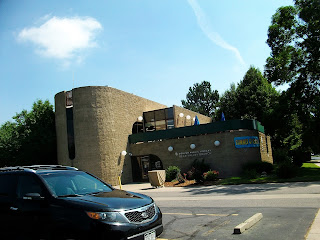--- The Library ---
2016
The first step in preparing for an adventure is research. I check to see what I can expect. Looking for gemstones in sedimentary rock is normally a losing proposition. I also like to know if there are hazards I will need to defend myself from. Is there a lot of verticality; will I need to pace myself for long distances and steep slopes? Are poisonous or hostile plants and animals a potential problem?
I have always maintained a good relationship with the staff of my local public library, especially the reference staff. They can help a lot when I'm looking for specific information. I also know how to use the InterLibrary Loan. I can usually get copies of academic journal articles less expensively through a library if those journals are available to the library, and they often are.
Here is a picture of the Central Branch of the Denver Public Library,
and here are some pictures of the Bear Valley Branch, my local library.
They have a nice rooftop patio where you can sit and read.
(pictures of Bear Creek Branch Library and the central Denver Public Library)
Of course, I just like being in a library. I've worked in libraries so they feel comfortable to me and libraries are adventures in their own rights. Most public libraries are part museum. For instance, the Selma Public Library maintained a local artist gallery and upstairs was a salt water aquarium.
My local library, the Bear Creek branch of the Denver Public Library has much more than books. They have computer terminals, music disks, video disks (movies, commentaries, lectures), and graphic novels. The central library upstairs has special exhibits and houses a western history museum. It's a huge building that has a lot going on in it. Like many modern public libraries, it has a website (https://www.denverlibrary.org)
Some people don't live close to a public library and, if you're like me, you like to have a reference library at your fingertips.
The Internet itself is a vast compendium of information. The problem is that the quality of the information you find there is often not good. Anybody can post just about anything to the Internet (there are a few things they might get in trouble for posting but they usually get away with it for a short time - until someone notices what they're doing.)
I keep a sizable library of website links in my resource hub. I have links for all the topics. I am hesitant to post website links because the websites they lead to often shut down without warning and I have dead links on my website, but there are a few that I have to share. To do otherwise would be inconsiderate.
The Yale-New Haven Teachers Institute site is a favorite. Aside from giving me ideas when I was a tutor, it gives me ideas for adventures. I can usually adapt a teaching module to a fieldtrip. Here's the link:
http://www.yale.edu/ynhti
You will see me refer to it occasionally.
Do you want a reference library for your computer - dictionaries, book sources, almanacs, directories, pretty much the kind of stuff your public library has in it's reference section - MIT has it for you here:
http://libguides.mit.edu/c.php?g=176227&p=1160775
Wikipedia has been criticized in the past for being too open for changes by people who don't know the subjects they post information about. Since Wikipedia is a huge Internet site built by its users, that's a real concern, but they seem to have worked out most of the problems and I rarely find glaring errors in the articles I use. But, then, the real power of Wikipedia is the bibliographic references at the end of each article. Here's an address:
https://www.wikipedia.org
Once you get to your language version, be sure and check all the home page. Wikipedia has several sister projects which provide things like media clips, textbooks, a library of quotations, subject curricula, software, books, travel guides, news, a species taxonomy of living things, and a dictionary and thesaurus.
Another vast Internet resource is Google. It's not just a web browser. Take a look at all these tools provided by Google:
https://www.google.com/intl/en/about/products
The Internet isn't a very good place to find peer reviewed information on specific topics. In college, I had access to citation indexes that covered all the major journals and, when I left, I kept my alumni status for that very reason. But Google has Google Scholar which provides a search utility for academic resources. I use it a lot to keep up with academic articles about therianthropy.
There are many eBook libraries on the Internet. Two of the best are the Gutenberg Project and the Internet Archives, and again, both offer many services other than eBooks.
Gutenberg Project: http://www.gutenberg.org/wiki/Main_Page
The Internet Archive: https://archive.org
I also use an eBook management program, Calibre, that will search the Internet for eBooks. It's a free download and you can find it here:
https://calibre-ebook.com
Pueblo, Colorado is the site of the United States' depository of practical knowledge, the Federal Citizen Information Center. It is a vast wealth of how-to-do-it information and it is here:
http://publications.usa.gov





No comments:
Post a Comment